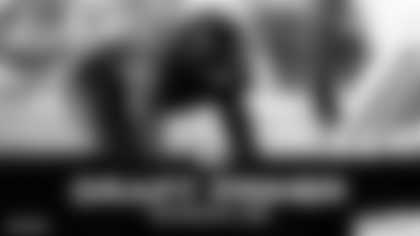Tight end Stephen Spach takes on a Colts' defender in the third game of 2009, eight months after surgery to fix a torn right ACL.
Stephen Spach was on the sideline, the Cardinals in the middle of thrashing the Carolina Panthers in their NFC divisional playoff in January of 2009, and the tight end's right knee was hurt.
Hurt badly.
The doctor mentioned it was probably a tear of the anterior cruciate ligament. Spach didn't want to hear it. "Don't," Spach answered. "Don't say that. Don't tell me that until you've seen an MRI, until I've seen an MRI. Just don't even say ACL."
"Because," Spach says now, fully rehabilitated from his injury, "that just sounds terrible."
Reality says it isn't. Not as terrible as it used to be, at least.
As recently as the late 1980s, an ACL injury created a "vibe that maybe a guy would never play again," Cardinals head athletic trainer Tom Reed said. Just 10 years ago, tearing an ACL meant a player would be virtually sidelined a year, unless he was lucky. The idea he would return to his pre-playing ability seemed dubious.
Ripping up a knee still isn't great news. It's mentally draining and rehabilitation is difficult. Returning, however, is all but assumed anymore. Advances in both the surgery and the rehab helped get Spach, who underwent surgery days after getting hurt and was back on the field during training camp, playing in preseason games.
They also made the Cardinals comfortable enough to spend a fourth-round draft pick on pass-rushing linebacker O'Brien Schofield, who shredded his knee during a practice at the Senior Bowl in January.
"We felt the risk is certainly not what it used to be," general manager Rod Graves said.
Said Spach, "You know it has been done before. The advances in science and rehab are ridiculous."
*
NFL Network, which covers every inch of the Senior Bowl, was there with its cameras, chronicling one-on-one pass rush drills. Schofield went up against Massachusetts tackle Vladimir Ducasse. Having beat Ducasse once, Schofield knew his opponent would be geared up for a second try. Schofield tried a different move, spinning off a Ducasse straight-arm.
Schofield’s foot got stuck in the ground, his left knee exploding.
A week later, Schofield tried to watch. "It was crazy – my knee starting hurting really bad," Schofield said. "I was like, 'I'm not going to watch it for a while.'
"Now, every once in a while I watch it and think, 'I'm not going to make that move again.' "
That may not be the most rational response, because once Schofield heals, he can return to normalcy. But the psychology of repairing a knee ligament tear is 95 percent of the battle, Reed said.
"Repairing an ACL for a surgeon is like taping an ankle for us," Reed said. "And the rehab for us, with all the experience we have had over the years, is not hard."
Famed sports surgeon Dr. James Andrews was one of the team doctors at the University of Kentucky when Reed worked there. Andrews' partner, Dr. Bill Clancy, invented what is considered the "gold standard" of bone tendon grafts to repair the ACL in football players, Reed said.
As the years have progressed, the surgery and rehab protocols have been refined. The time to return to the field hasn't necessarily shrunk (it remains about six to nine months) but the chances of hiccups or further problems aren't as prevalent.
Schofield becomes easier to bet upon. Checked at the scouting combine and then rechecked a couple of times, Schofield underwent not only an ACL repair but also a repair of a torn lateral meniscus. By choosing to repair instead of cutting out the damaged meniscus, Schofield's recovery in the short-term will be slowed. But it will help his knee long-term by avoiding arthritic problems caused by losing the cartilage.
"You know, in the back of your mind, (Schofield) is going to be OK," Reed said.
Schofield, noting the NFL is a business, doesn't want to rush back on the field. He, like the Cardinals, would like to play in 2010, but "they don't need me to play this season."
"That's what I am putting into perspective," he added.
His focus now is rehab. A Wisconsin product, Schofield has talked to Bills receiver (and former Badger) Lee Evans, who went through two ACL repairs. He's talked to Raiders defensive end Matt Shaughnessy, an ex-college teammate who tore his ACL in college.
"In football, you get injured," Schofield said. "It was my first major injury so I was more in shock. But I'm not a person that goes into a depressed state. This was a chance to do what football shows you to do, play through adversity.
"Coming out of this stronger than ever will just show what I'll do on the field no matter the situation: Fourth-and-1 in the fourth quarter and we are down three, I am going to make that play."
*
Cardinals coach Ken Whisenhunt played in the NFL from 1985-93. In his tight end days, he said the first move to aid an ACL injury was to put the player in a cast for a couple of months. In contrast, the Cardinals saw Schofield at the Scouting combine about a month after his surgery and he was walking without a noticeable limp.
Watching Spach return in six months also gives the Cards comfort. And Schofield hope.
It wasn't simple for Spach. The idea his career was over flashed through his mind that night in Carolina. The mountain of surgery and rehab seemed steep when he first started. But then a player gets into the groove of rehabbing. Milestones are reached. Trainers and doctors bring up players that successfully returned -- and noted to Spach he was ahead of the other player's schedule.
"Some days are better than others," Spach said. "It seems so far away when you look outside and see guys running and you can't run yet … but then time flies and you're back in it."
Spach is confident Schofield will come back, although he emphasized, "there is a difference between being able to play and compete and getting to where you feel like it never happened."
After an ACL tear, though, it's tough to quibble on the details when the initial scare was never playing again.
In his first full practice back in training camp last year, Spach still was worried. In the back of his mind, he couldn't help but ponder his rebuilt knee and think, "God, I hope this holds up."
"But once you're out there and you hear the play called, it's the greatest feeling in the world," Spach said. "You're a player again."
Returning From Disaster
Tearing an ACL isn't a career-killer anymore
May 06, 2010 at 09:33 AM

This article has been reproduced in a new format and may be missing content or contain faulty links. Please use the Contact Us link in our site footer to report an issue.














